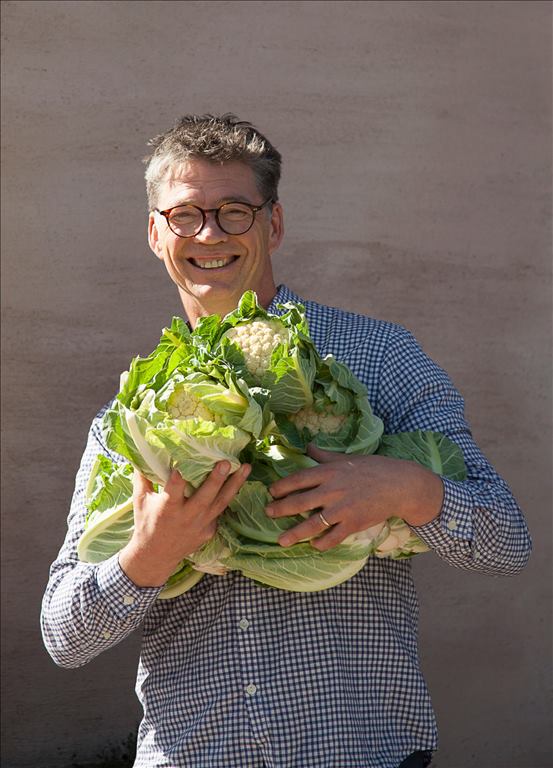James Fitzgerald talks to the man who championed seasonal vegetables well before they became fashionable.
Guy Singh-Watson, founder of Riverford Organic Farmers, is thinking outside the box once again as he prepares to turn the online fruit and vegetable delivery business over to his workers.
Riverford, which has a £60m turnover and delivers about 50,000 organic veg boxes a week nationwide, will become an employee trust on June 8.
“Because Guy doesn’t believe in inherited wealth and thinks the brand name would be abused to sell mediocre food were it to be bought by venture capitalist investors, he is selling it into staff ownership at a ridiculous discount. He believes the staff are best placed to protect the founding values of the business,” Rachel Lovell, marketing manager, told Chief-Exec.com.
Mr Singh-Watson will retain 26 per cent of the company, with the remainder being sold to staff for £6m — a figure that does indeed seem tokenistic.

Guy Singh-Watson, founder of Riverford Organic Farmers
“Guy really is exceptional; cantankerous, inspiring, passionate, opinionated, remarkable — someone who has changed the landscape of food and farming in this country in his own small way, championing seasonal vegetables well before it was fashionable. A freak on the fringe, but an authentic one who is really making the world a little bit better,” says Ms Lovell.
Riverford, which was formed 30 years ago, is following in the footsteps of cosmetics chain Lush and travel company Sawday’s, with a trust model that is “quite similar to John Lewis’s shared model”. Legislation introduced in 2013 has made it easier and more tax efficient to transfer businesses over to employees.
However, Riverford maintains that its decisions are based on ethical considerations. “A great deal of the success of Riverford can be put down to Guy’s belief in what organic food is about,” says Ms Lovell. “He is adamant that organic should not be elitist — it is for everyone. Riverford is about being fair on every level, from the growers to staff, through to the customer. Prices are agreed with all of our growers in advance and we stick with them — a far cry from how the supermarkets operate.”
Mr Singh-Watson sees himself as not just a business person, but also an activist. “What’s the saying, ‘be the change you want to see in the world’? I would like to live in a world that is more libertarian, with capital working for labour, not the other way around. I feel strongly that a business should be controlled by the people who run it,” he says.
“I now employ over 650 people and I don’t even know some of them. When I was a farmer’s son we could be more relaxed about day-to-day decisions, but our business has outgrown that now.”
Riverford is awaiting the final figures on its valuation ahead of the transfer. “I will remain the face of the business, but I spend as little time as possible in meetings, or even in the office. I’m more of a travelling trouble shooter,” says Mr Singh-Watson. “Too many decisions are made in the boardroom, when they would be better made on the shop floor or in the field. I want to be challenged by staff because you need to keep asking questions — otherwise you can fall into the trap of believing your own hype.”
‘ … Organic should not be elitist — it is for everyone. Riverford is about being fair on every level, from the growers to staff, through to the customer.’
Mr Singh-Watson says he will be spending more time mentoring small business owners, and “may end up investing in those in some way”.
He also sees some fundamental differences between Riverford and the Whole Foods chain, which was bought by Amazon for $13.7bn in August last year.
“Amazon’s mantra is that the customer is always right, but I disagree. You can’t be a values-driven business without having set values. If the customer wants an airfreighted pineapple from Togo, do you buy them even if the carbon footprint is enormous?”
The trust status will help to ensure the business is not subject to de-mutualisation or a similar takeover, as most of the assets are designated to charity in the event of a sale or dissolution. Power is divided between the board, and elected staff council and a partly elected board of trustees.
Independent retail sales of organic food in the UK grew by 9.7 per cent in 2017, and in-home delivery by 9.5 per cent, with almost 30 per cent of all organic sales now taking place online or on the high street, according to the Soil Association. Supermarket sales of organic produce have also continued to increase, rising by 4.2 per cent this year, while non-organic sales increased by just over 2 per cent.
Clare McDermott, the Soil Association’s business development director, says: “One of the biggest stories for organic over the past couple of years has been the rise of online shopping, and it’s a trend that shows no sign of slowing down. Online retail is also able to adapt and innovate at a faster pace than in-store, bringing new and trend-led products to market, and people are recognising that they can often find a better range online.”
The Soil Association’s head of farming, Liz Bowles, says the amount of land in conversion — switching from conventional to organic — increased by 22 per cent last year. She says switching to organic offered financial benefits to growers.
Data from the Soil Association suggests that the net farm income from an organic farm was £211 per hectare in 2015-16, compared with £96 per hectare for non-organic.

Image Credits: Riverford Organic Farmers




